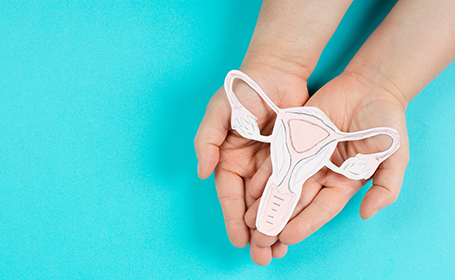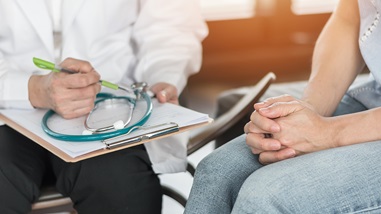
Endometriosis why is it so hard to diagnose
Endometriosis is a very common and painful condition – so why can it take up to 10 years to get a diagnosis?
It mainly affects women and is often discussed as a solely women's condition. However, endometriosis can affect intersex, transgender and gender nonconforming people too.
In extremely rare cases it has been found in infants and in cisgender men. However the majority of sufferers are women.
It’s relatively common, affecting around 1.5 million women in the UK. It's thought that 1 in 10 women will experience endometriosis at some point during their reproductive years.Endometriosis has a severe impact on the quality of life of the people who experience it, and can be debilitating. Despite this, getting a diagnosis can be a long and difficult process.
Research shows that, on average, there are 7.5 years between patients first seeing a doctor about their symptoms and receiving a firm diagnosis. But why, and what can be done?
What is endometriosis?
Endometriosis is a condition that causes womb tissue (endometrium) to show up in other parts of the body. From the ovaries to the bowel, these womb cells can appear in a range of places.
With every period these tissue deposits bleed too, causing inflammation and scarring. This leads to severe pain and related health problems, including infertility.
The condition tends to affect people who are menstruating and doesn't normally occur after the menopause.
It's thought that 1 in 10 women will experience endometriosis at some point during their reproductive years.
Symptoms of endometriosis
Symptoms of endometriosis are different for each person. Not everyone will get all - if any - symptoms. Those who do tend to experience different symptoms to different extents.
However, common symptoms of endometriosis include:
- Severe period pain
- Heavy periods
- Pelvic pain
- Painful sex
- Pain when going to the toilet
- Blood in your poo
- Feeling tired all the time
If you have any or all of these symptoms, you should make an appointment to see your GP.
Diagnosing endometriosis
The only conclusive way to diagnose endometriosis is to have a laparoscopy.In this procedure, a surgeon inserts a small camera into the pelvis via a small cut near the navel. The surgeon can then look for signs of endometriosis.
If they find it, the endometrium tissue may be able to be treated then and there, or a sample might be removed for testing.
Getting diagnosed with endometriosis can take a long time. The main reason for this is that the symptoms are very similar to the symptoms of other conditions.
There are lots of other reasons that can cause period pain, painful sex and pain going to the toilet – and these all have to be ruled out.
Diagnosing endometriosis is also complicated as not every person has every symptom, and the severity of the symptoms varies from person to person.
It's also believed that a lack of awareness among both medical professionals and the wider population contributes to the length of time to diagnosis.

Getting a faster diagnosis
Keep a symptoms diary
The best thing you can do to help your doctor diagnose you is to keep a diary for a few months, detailing what symptoms you have, when they occur, and how severe they are.
This will help them to spot patterns in your symptoms, and also ensures you don’t forget any vital details.
Share as much as possible
While the symptoms of endometriosis involve several bodily functions commonly felt to be ‘taboo’, you need to share as much detail with your doctor as you can.
Some people find it helpful to book a double appointment, to give themselves more time to discuss their experiences.
Ask for a referral
If you’re still concerned, you can ask to be referred to a specialist. Endometriosis can only be conclusively diagnosed by a laparoscopy, carried out by a gynaecologist.
Speak to your GP about how to secure a referral to an endometriosis specialist.
There is currently no cure for endometriosis, however there are treatments available.
Treating endometriosis
There is currently no cure for endometriosis, however there are treatments available. Medical treatments may help to manage the symptoms. These include anti-inflammatory painkillers and hormone treatments. Some hormone treatments are designed to slow the growth of endometriosis. It should be noted that none of these therapies actually get rid of the disease. They simply reduce the severity of the symptoms in a proportion of, but not all, patients.Surgery is the only way to remove the endometriosis growths. This is commonly performed as a laparascopic (keyhole) procedure, but in severe cases it may require open surgery.
Ablation surgery
When superficial endometriosis is identified in your pelvis during your laparoscopy, thermal energy can be applied on the spots of endometriosis to evaporate and therefore treat them. Unfortunately, if the endometriosis is deep in the tissues, ablation technique may fail to treat it.
Excision surgery
When superficial or deep endometriosis is identified in your pelvis during your laparoscopy, these areas are cut out and the specimens are sent to the laboratory to confirm the presence of endometriosis. This treatment method is believed to be more effective in treating deep infiltrating endometriosis.
Although surgery can remove endometrial growths, it is not a cure. Endometriosis can return, and more than half of women who undergo surgery will need to have a second procedure.
Although living with endometriosis can be painful and challenging, it's possible to live a happy, healthy life with the condition. Speak with one of our consultants about treatment for endometriosis today.
Tags
How do I book an appointment?
If you're concerned about symptoms you're experiencing or require further information on this subject, talk to a GP or see an expert consultant at your local Circle Hospital.